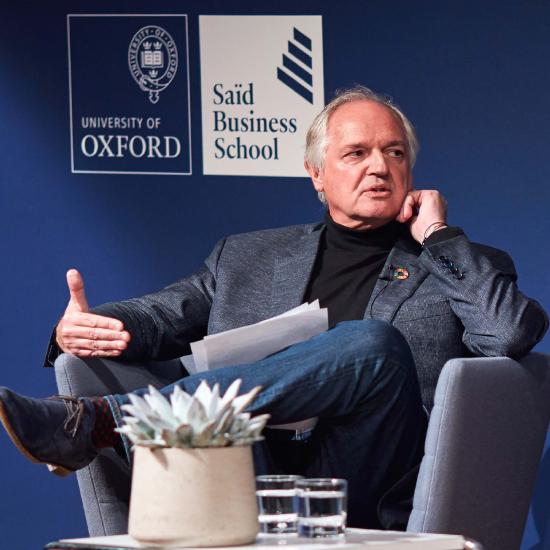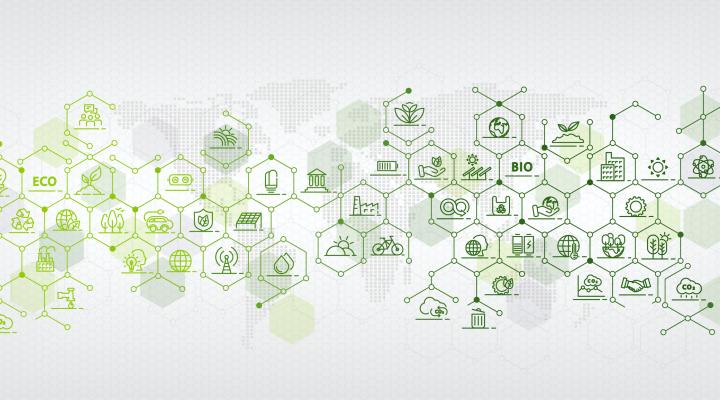Paul Polman does not mind sceptics. He has very little time for cynics, he says, because cynicism ‘is an abdication of responsibility that I find is the lowest level of leadership’. But sceptics are different: ‘They challenge you; they ask you to explain things’.
And once you are engaging with them, it is easier to bring them on board with world challenges such as climate change by talking about specific issues that are relevant to them. Anyone living in Delhi, London, or Rome can relate to the problems of air pollution, for example, and, ‘deforestation, people understand. Having more plastic in the ocean than fish is something that people understand’. This communication is vital because, ‘If we don’t tackle climate change … poor people suffer most, and women and girls. It affects water, sanitation, and health. As a result, the overall sustainable development goals will be very difficult to achieve.’
The urgency of the UN SDGs
With 17 goals and 69 targets, the magnitude and complexity of the United Nations Sustainable Development Goals (SDGs) can be overwhelming for some, says Polman, and that is why many CEOs think it is important to keep communication about them simple and positive. But is that enough?
All the goals are interlinked, but for Polman the two most ‘burning issues in the world’ are expressed in number 1 (eliminating poverty in all its forms) and number 13 (fighting climate change and its effects): ‘They are actually two sides of the same coin. It is easy to explain that the issues of climate change that we are dealing with in all parts of the world are affecting the poor more than anyone else.’
And ‘the reality is that we’re five years in [the SDGs were agreed and the Paris Agreement on Climate Change signed in 2015]. The plane is on the runway, but we haven’t even had the engines rev. The reality is that since the Paris Agreement our emissions have increased ... none of the governments of substance have actually fulfilled any of the commitments.’

He argues that governments urgently need to increase their ambitions, saying that 77 per cent of Americans want the USA to stay in the Paris Agreement and that even amongst Republicans 80 per cent believe that the climate crisis is man-made. Businesses, admittedly often acting under pressure from their employees, have pledged to meet environmental targets – and Polman pointed out that it made economic sense even if they did not recognise the moral imperative.
‘Companies that have taken action on climate have higher returns. The only CEOs that I can understand not doing anything are those who are too vested in what the current system gives them. But that’s only a few. I think that most CEOs now know that the only way to stay profitable is to change.’
The plane is on the runway, but we haven’t even had the engines rev. The reality is that since the Paris Agreement our emissions have increased ... none of the governments of substance have actually fulfilled any of the commitments.
The need to move to business 'unusual’
Everyone is mostly heading in the right direction – ‘You won’t find any CEO who says “I want more air pollution. I want to cut down more forests. I want more people to go to bed hungry”’ – but Polman stresses that ‘collectively it’s not adding up. The direction might be right but the scale and speed is not.’
This is because we are ‘stuck’ in our current system, working within existing boundaries and assumptions, and unable to make the ‘step change’ that will move beyond marginal improvements. We need to move beyond ‘business as usual’, he says, and develop ‘business unusual’.
To do that, Polman calls on all of us to make four changes to the global system:
- De-carbonise our global economy, whether we like it or not. ‘We are carbon junkies.’
- Move from a linear economy to a circular economy. Our linear consumption system means that we are using far more resources than the world can replenish, and wasting far too much in every area.
- Move the financial markets to focus long term. ‘It’s a tough one but you cannot solve climate change or food insecurity or poverty if you stick to the tyranny of quarterly reporting … Governments need to step in because the real economy has become subservient to the financial markets.’
- Create a more inclusive economic system. ‘We have an economic system that benefits the few but not the many. A system in which too many people feel they’re not participating will ultimately rebel against itself.’
Leaders need to step up and feel uncomfortable

Historically, we would have relied on governments and international institutions to change the system. ‘But most of the institutions we have now date from 1945 when the world was very different. So global governance is a bit of a vacuum right now and indeed going backwards if you believe the newspapers.’
Polman is calling on leaders in other capacities – civil society, NGOs, business – to step up and lead the change. He warns that it would not be easy or comfortable. Indeed, ‘If you don’t feel uncomfortable driving some of these changes and [you’re not experiencing] a certain level of resistance you’re not going far enough or fast enough’. Leaders need to think long-term and intergenerationally. They need to be able to embrace complexity and systems change. And they need to have the will to push against the status quo.
‘It’s not a matter of “we don’t know how to do it”. And it’s not a matter of “we can’t do it”. It’s a matter of “do we really want to do it?” Any time we walk past a homeless person we have to ask ourselves what we are doing to solve the problem. By staying silent, by not being active on some of the issues that we have, by being participants in food waste or plastic waste or over-consumption, you are complicit. You are complicit in driving other people into poverty. 99 per cent of the issues we have today can be solved. The question is, do we care?’




